Europe
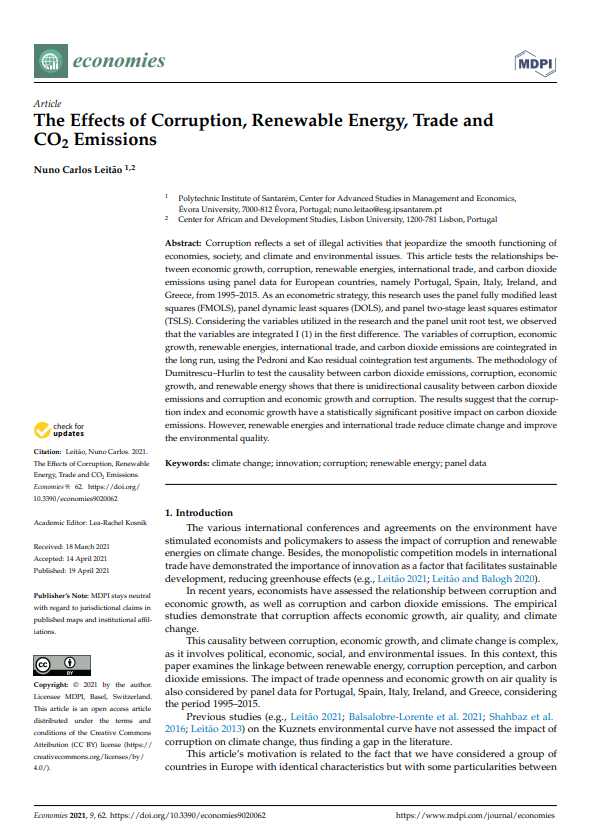
The Effects of Corruption, Renewable Energy, Trade and CO2 Emissions
Abstract:
Corruption reflects a set of illegal activities that jeopardize the smooth functioning of economies, society, and climate and environmental issues. The Effects of Corruption, Renewable Energy, Trade and CO2 Emissions tests the relationships between economic growth, corruption, renewable energies, international trade, and carbon dioxide emissions using panel data for European countries, namely Portugal, Spain, Italy, Ireland, and Greece, from 1995–2015. As an econometric strategy, this research uses the panel fully modified least squares (FMOLS), panel dynamic least squares (DOLS), and panel two-stage least squares estimator (TSLS). Considering the variables utilized in the research and the panel unit root test, we observed that the variables are integrated I (1) in the first difference. The variables of corruption, economic growth, renewable energies, international trade, and carbon dioxide emissions are cointegrated in the long run, using the Pedroni and Kao residual cointegration test arguments. The methodology of Dumitrescu–Hurlin to test the causality between carbon dioxide emissions, corruption, economic growth, and renewable energy shows that there is unidirectional causality between carbon dioxide emissions and corruption and economic growth and corruption. The results suggest that the corruption index and economic growth have a statistically significant positive impact on carbon dioxide emissions. However, renewable energies and international trade reduce climate change and improve the environmental quality.
Quotation:
Leitão, N.C. (2021b). The Effects of Corruption, Renewable Energy, Trade and CO2 Emissions (MDPI) 2021, 9 (2), 62. https://doi.org/10.3390/economies9020062
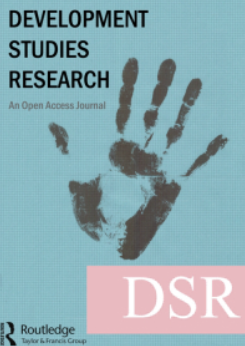
Identifying differences and similarities between donors regarding the long-term allocation of official development assistance
Abstract:
Advanced countries have pledged to mobilize additional financial resources to developing countries, including funding from multiple sources other than official development assistance (ODA), known as foreign aid. However, the effect of the novel coronavirus pandemic has raised doubts about the feasibility of such a pledge, highlighting, once again, the possible role of ODA and the importance of explaining its allocation, which could be of vital relevance for understanding its effectiveness. Identifying differences and similarities between donors regarding the long-term allocation of official development assistance analyzes a vast number of bilateral and multilateral donors by applying a novel methodology in the context of aid allocation – principal-component factor analysis – covering the period 1990–2015. The results revealed four distinct clusters of donors: (i) the proportionally largest Western European donors, characterized by a significant number of beneficiaries, especially low-income countries; (ii) donors that are predominantly driven by structural links with recipients, especially links derived from colonial connections; (iii) a group of mainly Eastern European donors who are engaged with lower-income countries in Eastern Europe and Western Asia; and (iv) a group of Asian and Oceanian donors that select their partners mainly based on the geographical proximity criterion.
Quotation:
Paulo Francisco, Sandrina B. Moreira & Jorge Caiado (2021) Identifying differences and similarities between donors regarding the long-term allocation of official development assistance, Development Studies Research, 8:1, 181-198, DOI: 10.1080/21665095.2021.1954965
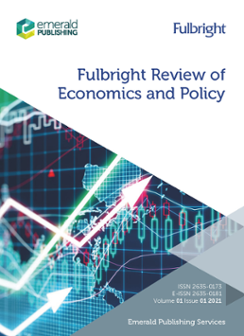
Common causes in grassroot development: a case for community-based and community-driven response in the postpandemic era
Abstract:
The purpose of Common causes in grassroot development: a case for community-based and community-driven response in the postpandemic era is to determine the impact of community-based and driven approaches during the lockdowns and early periods of the pandemic. The study examines the impact and perceptions of the state-led intervention. This would help to discover a better approach for postpandemic interventions and policy responses. This article used the inductive method and gathered its data from surveys. In search of global opinions on COVID-19 responses received in communities, two countries in each continent with high COVID-19 infection per 100,000 during the peak period were chosen for study. In total, 13 community workers, leaders and members per continent were sampled. The simple percentile method was chosen for analysis. The simple interpretation was used to discuss the results. The study showed that poor publicity of community-based interventions affected awareness and fame as most were mistaken for government interventions. The study found that most respondents preferred state interventions but preferred many communities or local assessments of projects and interventions while the projects were ongoing to adjust the project and intervention as they progressed. However, many preferred community-based and driven interventions.
Quotation:
Patrick-Agulonye, U.V. (2021). “Common causes in grassroot development: a case for community-based and community-driven response in the postpandemic era” Fulbright Review of Economics and Policy, Vol. 1 No. 2, pp. 186-204. https://doi.org/10.1108/FREP-09-2021-0056
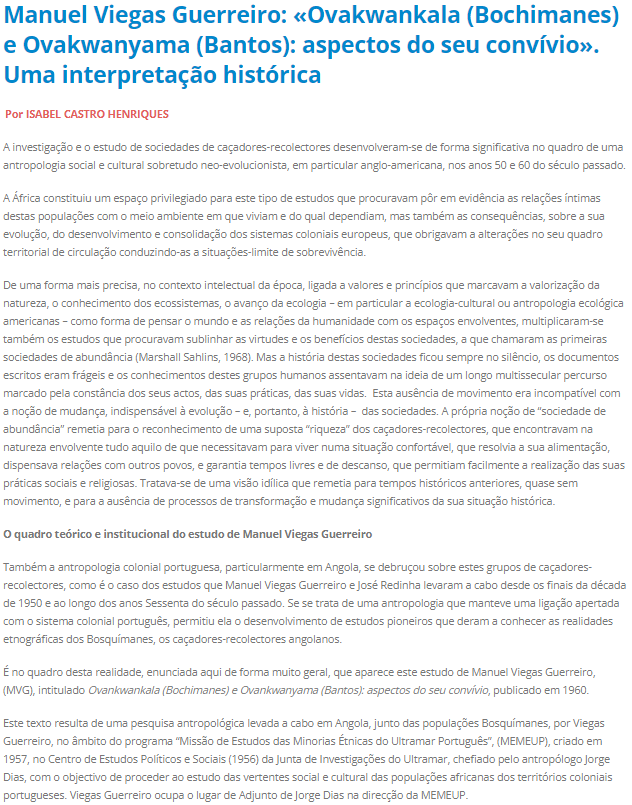
Manuel Viegas Guerreiro: «Ovakwankala (Bochimanes) e Ovakwanyama (Bantos): aspectos do seu convívio». Uma interpretação histórica.
Abstract:
The research and study of hunter-gatherer societies developed significantly within the framework of a mainly neo-evolutionist social and cultural anthropology, particularly Anglo-American, in the 1950s and 1960s. Africa constituted a privileged space for this type of study which sought to highlight the intimate relations of these populations with the environment in which they lived and on which they depended, but also the consequences, on their evolution, of the development and consolidation of the European colonial systems, which forced changes in their territorial framework of circulation, leading them to situations at the limits of survival. In a more precise manner, in the intellectual context of the time, linked to values and principles which marked the valorisation of nature, knowledge of ecosystems, the advance of ecology – in particular American cultural-ecology or ecological anthropology – as a way of thinking about the world and humanity’s relations with the surrounding spaces, there was also a multiplication of studies seeking to underline the virtues and benefits of these societies, which were called the first societies of abundance (Marshall Sahlins, 1968). But the history of these societies always remained silent, the written documents were fragile and knowledge of these human groups was based on the idea of a long, multi-secular path marked by the constancy of their acts, their practices and their lives. This absence of movement was incompatible with the notion of change, which is indispensable to the evolution – and therefore the history – of societies. The very notion of “society of abundance” referred to the recognition of a supposed “wealth” of hunter-gatherers, who found in the surrounding nature everything they needed to live in a comfortable situation, which solved their food needs, dispensed with relations with other peoples, and guaranteed free time and rest, which easily allowed them to carry out their social and religious practices. This was an idyllic vision that referred back to previous historical times, almost without movement, and to the absence of significant transformation and change processes in their historical situation. In Manuel Viegas Guerreiro: «Ovakwankala (Bochimanes) e Ovakwanyama (Bantos): aspectos do seu convívio». Uma interpretação histórica. Isabel Castro Henriques comments on the homonymous study conducted by Manuel Viegas Guerreiro.
Quotation:
“Castro Henriques, I. (2021). «Manuel Viegas Guerreiro – Ovakwankala (Bochimanes) e Ovakwanyama (Bantos): aspectos do seu convívio. Uma interpretação histórica. Lisbon, Newsletter Fundação Manuel Viegas Guerreiro, no 27, julho-setembro 2021, pp. 10-16.”
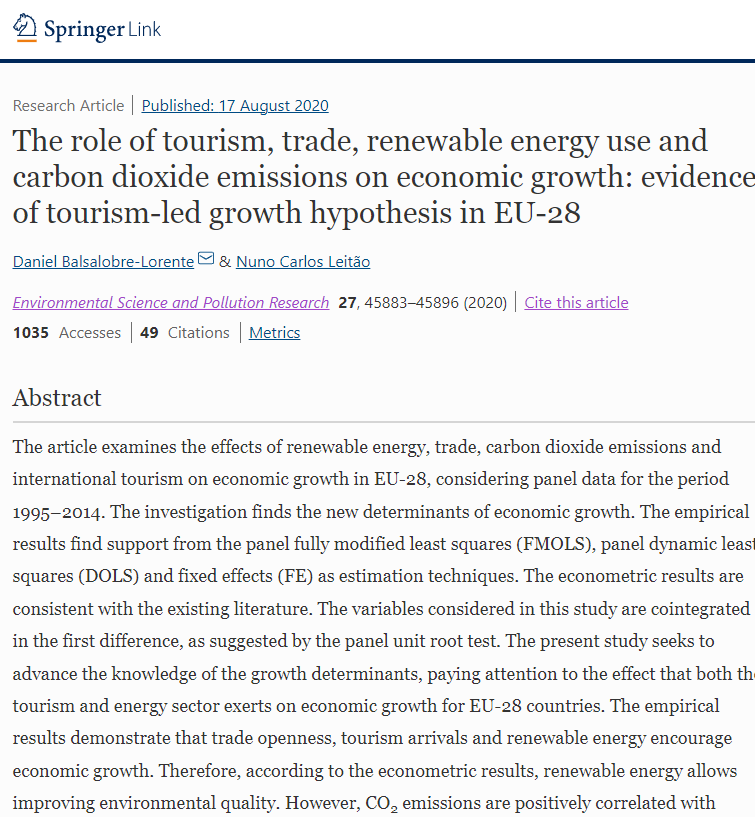
The role of tourism, trade, renewable energy use and carbon dioxide emissions on economic growth: evidence of tourism-led growth hypothesis in EU-28
Abstract:
The Role of Tourism, Trade, Renewable Energy Use and Carbon Dioxide Emissions on Economic Growth: Evidence of Tourism-Led Growth Hypothesis in EU-28 examines the effects of renewable energy, trade, carbon dioxide emissions and international tourism on economic growth in EU-28, considering panel data for the period 1995–2014. The investigation finds the new determinants of economic growth. The empirical results find support from the panel fully modified least squares (FMOLS), panel dynamic least squares (DOLS) and fixed effects (FE) as estimation techniques. The econometric results are consistent with the existing literature. The variables considered in this study are cointegrated in the first difference, as suggested by the panel unit root test. The present study seeks to advance the knowledge of the growth determinants, paying attention to the effect that both the tourism and energy sector exerts on economic growth for EU-28 countries. The empirical results demonstrate that trade openness, tourism arrivals and renewable energy encourage economic growth. Therefore, according to the econometric results, renewable energy allows improving environmental quality. However, CO2 emissions are positively correlated with economic growth, showing that growth is directly correlated by climate change and greenhouse gas. The results also confirm the tourism-led growth hypothesis (TLGH) for the panel. Finally, the empirical results confirm that trade openness, energy use and international tourism contribute to enhance economic growth. Based on these findings, further insights and policy prescription are offered in the concluding section.
Quotation:
“Balsalobre-Lorente, D., Leitão, N.C. (2020): The Role of Tourism, Trade, Renewable Energy Use and Carbon Dioxide Emissions on Economic Growth: Evidence of Tourism-Led Growth Hypothesis in EU-28. Environmental Science and Pollution Research. Publisher: Springer International Publishing”
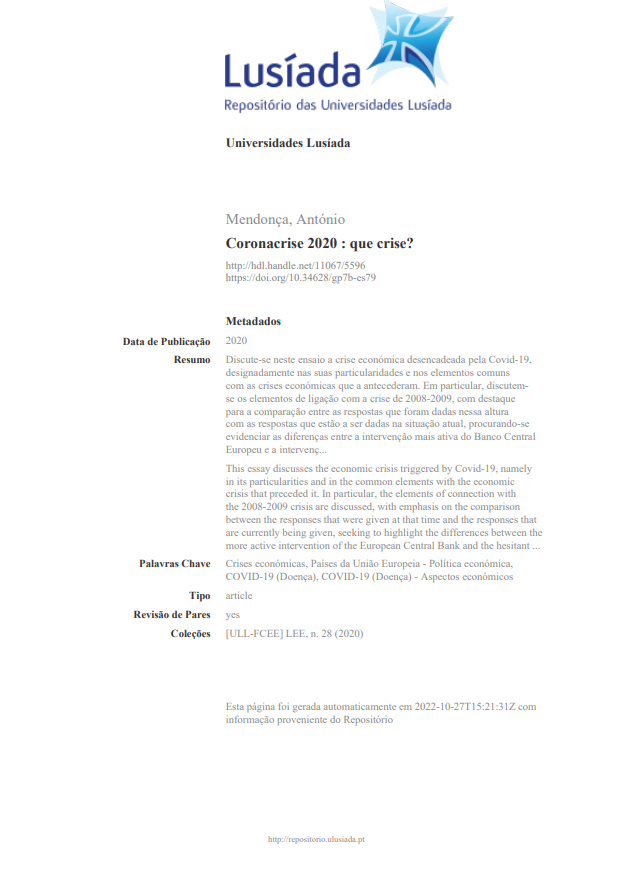
Coronacrise 2020: que crise?
Abstract:
The forecasts already published by national and international institutions on the impact of Covid-19 on economies confirm what had already been anticipated: deep falls in product and employment, fuelled by the joint reduction in consumption, investment and international trade, with consequent effects on deficits and public debt. Coronacrise 2020: que crise? discusses the economic crisis triggered by Covid-19, namely in its particularities and in the common elements with the economic crisis that preceded it. In particular, the elements of connection with the 2008-2009 crisis are discussed, with emphasis on the comparison between the responses that were given at that time and the responses that are currently being given, seeking to highlight the differences between the more active intervention of the European Central Bank and the hesitant and contradictory intervention of national and European institutions with responsibility for fiscal policy. We highlight the need for an economic recovery plan, with a European dimension and integrating national specificities, as well as the need for a change in attitude regarding the role of economic policy, that should favor a long-term expansionist perspective instead of the contractionary perspective which has conditioned European macroeconomic management in recent years.
Quotation:
Mendonça, A. (2020). “Coronacrise 2020: que crise?”. Lusíada. Economia & Empresa, nº 28 (2020), pp. 11-41. https://doi.org/10.34628/gp7b-es79
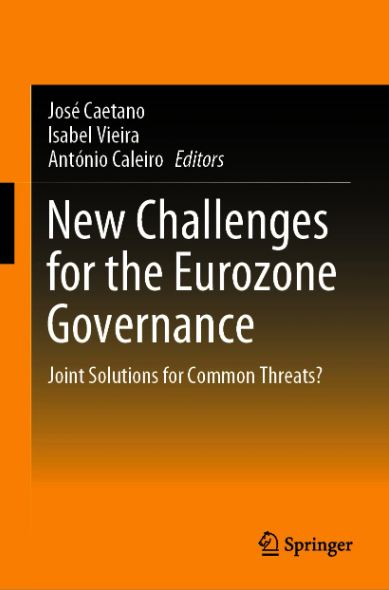
Europe at the crossroads of the COVID-19 crisis: integrated macroeconomic policy solutions for an asymmetric area
Abstract:
The economic crisis triggered by the COVID–19 pandemic once again raises doubts about the eurozone’s ability to deal with joint economic problems given its dissimilar dynamics and asymmetries. Europe at the crossroads of the COVID-19 crisis: integrated macroeconomic policy solutions for an asymmetric area contributes to a paradigm shift in the governance of the euro area towards a more comprehensive and integrated approach. Two dimensions of this paradigm are considered. First, the need for a change in the economic policy concerning the recovery, from a supply-push to a demand-pull orientation, supported on a fiscal and monetary policy mix, integrated within a comprehensive macroeconomic approach. Second, we examine the need for a shift in external relations towards a more global integration-oriented policy, with the euro area positioning itself as an alternative to the current polarization between the United States and China. Our conclusions point to: (i) giving priority to growth and employment; (ii) promoting long-term economic sustainability based on integrated macroeconomic policies, the reduction of income concentration, and the reconstitution of strong middle classes; (iii) reorientating international relations into a perspective of cooperation; (iv) reinforcing regulation and global governance; and (v) eliminating exceptional situations and ways to evade economic controls.
Quotation:
“Mendonça, A. and Vale, S. (forthcoming). “Europe at the crossroads of the COVID-19 crisis: integrated macroeconomic policy solutions for an asymmetric area”, (co-autoria com Vale, S.), in New challenges for Eurozone Governance: Are there joint solutions for common threats? (Edit. José Caetano, Isabel Vieira, and António Caleiro), London: Springer. ISBN-10:3030623718″
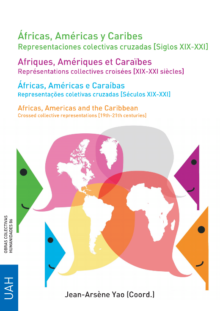
As (im) pertinências do método. Metodologia participativa e o estudo sobre a Afrodescendência em Portugal
Abstract:
The announcement of the Decade of African Descendants (2015-2024) by the UN, drew attention to the presence of African descendants in Europe, including in Portugal, as part of the contemporary social configuration of the continent. However, the focus on these people has been sustained, above all, in theories and representations of subalternity and exclusion that do not recognize them as new political subjects in a Europe that is no longer black and white. These politically hybrid subjects, in the historical and cultural sense, bring theoretical-epistemological and methodological challenges to the social sciences, since their visions, paradigms and ways of living escape the traditional lenses of the approaches that associate them with immigrants or refugees. We propose that in approaching the subject of Afrodescendence, method is central and determinant of the outcomes, ethical function and meaning of social research on emerging contemporary subjects. We argue in favour of participatory methodology, reflecting on its pertinence in a context where the people in the researched situation are critical subjects in their fields of intervention/action who reject being reduced to mere objects of study. We analyse the processes of negotiation in the field concluding on the contribution of this project to the dialogue between academics and the afrodescendant collectives. As (im)pertinências do método. Metodologia participativa e o estudo sobre a Afrodescendência em Portugal is inserted in the debate on the democratization of knowledge, sustained, in particular, by critical perspectives that are based on studies on emerging contemporary subjects.
Quotation:
Évora, Iolanda. “As (im)pertinências do método. Metodologia participativa e o estudo sobre a Afrodescendência em Portugal”, In: Yao, Jean-Arséne, Victorien Lavou Zoungbo et Luis Mancha San Esteban, eds. Forthcoming. Representations collectives croisées: Afriques, Amériques et Caraibes. Xix-xxi siècles. III GRELAT. Actas do Colóquio. Madrid: UAH Editora, 167-176. ISBN:978-84-18254-12-3.
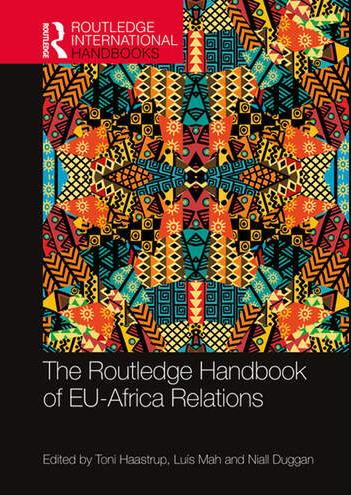
The Routledge Handbook of EU-Africa Relations
Abstract:
This handbook provides a comprehensive overview of the changing dynamics in the relationship between the African continent and the EU, provided by leading experts in the field. Structured into five parts, the book provides an incisive look at the past, present and potential futures of EU-Africa relations. The cutting-edge chapters cover themes like multilateralism, development assistance, institutions, gender equality and science and technology, among others. Thoroughly researched, this book provides original reflections from a diversity of conceptual and theoretical perspectives, from experts in Africa, Europe and beyond. The handbook thus offers rich and comprehensive analyses of contemporary global politics as manifested in Africa and Europe. This handbook will be an essential reference for scholars, students, researchers, policy makers and practitioners interested and working in a range of fields within the (sub)disciplines of African and EU studies, European politics and international studies. The Routledge Handbook of EU-Africa Relations, by Luís Mah (researcher for the Centre for African and Development Studies), Nial Duggan and Toni Haastrup is part of the mini-series Europe in the World Handbooks examining EU-regional relations and established by Professor Wei Shen.
Quotation:
Mah, Luís, Duggan, Nial & Haastrup, Toni (2021). The Routledge Handbook of EU-Africa Relations. Routledge. ISBN 9781315170916.
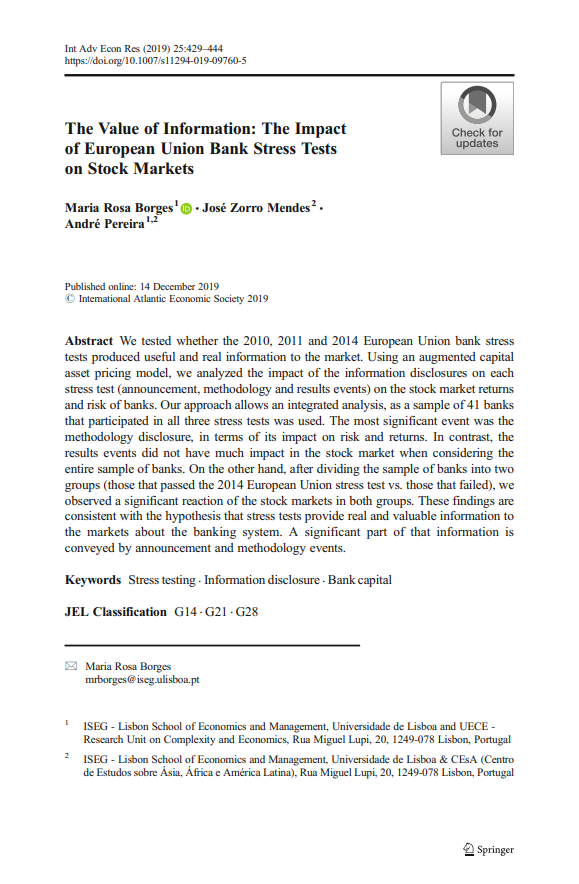
The Value of Information: The Impact of European Union Bank Stress Tests on Stock Markets
Abstract:
In The Value of Information: The Impact of European Union Banks Stress Tests on Stock Markets we tested whether the 2010, 2011 and 2014 European Union bank stress tests produced useful and real information to the market. Using an augmented capital asset pricing model, we analyzed the impact of the information disclosures on each stress test (announcement, methodology and results events) on the stock market returns and risk of banks. Our approach allows an integrated analysis, as a sample of 41 banks that participated in all three stress tests was used. The most significant event was the methodology disclosure, in terms of its impact on risk and returns. In contrast, the results events did not have much impact in the stock market when considering the entire sample of banks. On the other hand, after dividing the sample of banks into two groups (those that passed the 2014 European Union stress test vs. those that failed), we observed a significant reaction of the stock markets in both groups. These findings are consistent with the hypothesis that stress tests provide real and valuable information to the markets about the banking system. A significant part of that information is conveyed by announcement and methodology events
Quotation:
“Borges, M. R., Mendes, J. Z. and Pereira, A. (2019). “The Value of Information: The Impact of European Union Banks Stress Tests on Stock Markets”. International Advances in Economic Research, 25, 429-444. https://doi.org/10.1007/s11294-019-09760-5“





